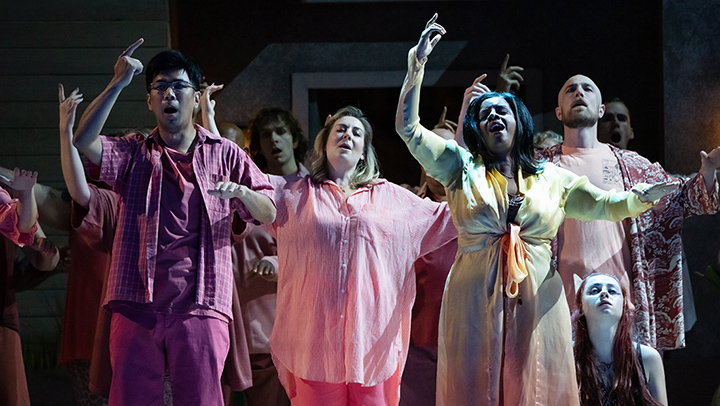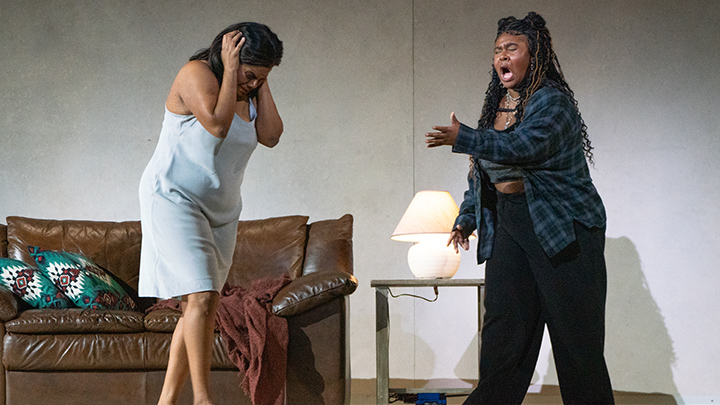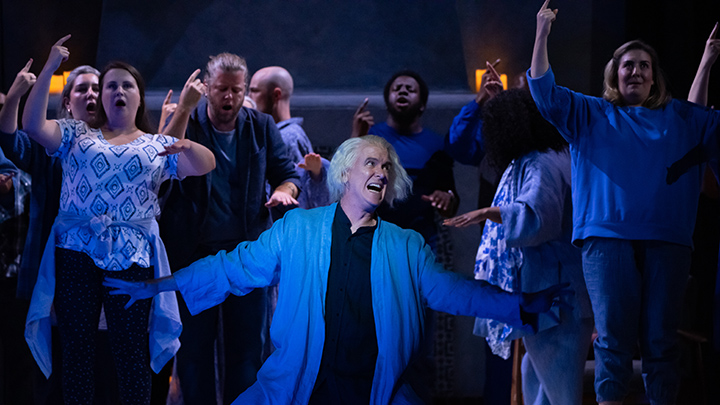At the Met, General Manager Peter Gelb co-commissioned Grounded by noted theater composer Jeanine Tesori with a libretto by George Brant based on his play. The responses I’ve read so far have been mixed—the all-important New York Times review was quite negative, though others were more enthusiastic. The chatter on various opera sites has also been equivocal, consistently raising the question of whether Gelb’s recent embrace of contemporary operas as a potential cure for what ails the Met is already showing worrying signs of diminishing returns.
No such doubts surround Opera Philadelphia. For this smaller company, contemporary and edgy have been happily transformative. In 2017, the first in a series of Festivals featuring new and boundary-defying works gave the company a national, even international presence. In opera terms, we were the Little Engine That Could.
A year before in 2016, the world premiere of Breaking the Waves by composer Missy Mazzoli and librettist Royce Vavrek marked a (you should forgive the expression) high water mark in the company’s history and earned then-General Director and President David Devan similar acclaim.
This year, the managerial baton passed to a surprising choice: Anthony Roth Costanzo, surely better known as a singer. The selection reinforced the sense that Opera Philadelphia wasn’t looking to follow a traditional path—and the prolonged cheers that went up when ARC, as he’s often called, took to the Academy of Music stage to introduce The Listeners confirmed that it’s a bold move worth making.
In another smart choice, this year’s season opener revisits the success of Breaking the Waves. The Listenersagain pairs Mazzoli and Vavrek in setting a thought-provoking and disquieting contemporary story. And once again, the result is impressive and exciting, often triumphantly so.
The source material here, a story by Canadian writer Jordan Tannahill, finds the inhabitants of small, rather drab American town, as they gradually become aware of a sonic hum that grows ever more persistent and attention-grabbing. Not everyone can hear it (that’s a critical point here), but for those who do, it’s life-altering in many ways. The hum is also inexplicably linked to the presence of a charismatic man named Howard who may or may not be a cult leader. Central among the town “listeners” is Claire Devon, whose respectable life as a teacher, wife, and mother is gradually thrown into freefall.
If the summary above is inconcrete, that’s a hallmark of The Listeners, which is work that dwells in the elliptical.
That also describes Mazzoli’s gorgeous score, a dazzling success in every way. The musical palate has an almost infinite, ever-changing range of sonic colors and textures—at once spiky and lyrical; beautiful, diaphanous, and unnerving. Mazzoli’s music is also eminently sing-able, full of flattering vocal lines: something of rarity in contemporary music.
Vavrek’s libretto similarly captures that world in concise, punchy prose, which can also reach poetic heights when required. Sometimes the text strains to feel “hip” – I lost count of the number of “fucks” along the way, each getting audience laughs that occasionally broke the mood. But more often, the story is compellingly told, with Mazzoli and Vavrek’s music and text seamlessly melded as effectively as in Breaking the Waves.
Music and drama both are admirably served here by an exceptional cast. Nicole Heaston brings a ravishingly liquid lyric soprano and easy, floating top register to the role of Claire — her emotional intensity is equally strong. As Angela, another participant caught in the sway of the “leader,” Rehanna Thelwell’s gloriously lush mezzo is coupled with a thrilling dramatic instinct (her monologue at the beginning of Act II is for me The Listener’s never-to-be-forgotten moment.)
There’s excellent supporting work from a large ensemble that includes baritones John Moore (a superb actor and a veteran also of Breaking the Waves), Joseph Lim and Troy Cook, mezzo Lucy Schaufer, sopranosDiana Newman and Lindsey Reynolds (the latter with a special sparkle), tenor Aaron Crouch, and more. Kevin Burdette brought exemplary diction to the character of Howard, the leader—every word “landed”—but his rather light tone and genial affect aren’t quite the right fit here.
There are some caveats that have to do mostly with the production as directed by Lileana Blain-Cruz. In fairness, she’s challenged from the start by the size and grandeur of the Academy of Music. The Listeners has quite a large cast, and its story has epochal sweep. Still, for me it’s a work that would be better suited to the intimate Perelman Theatre, where the performances would require less operatic projection, and the nuances of the piece could register more subtly (Breaking the Waves was staged in the Perelman to devastating effect).
In dealing with the Academy’s scale, Blain-Cruz sometimes overfills the stage with extraneous business, including a mystifying dancing coyote (the choreography is by Raja Feather Kelly). More problematically, she pushes too hard on the comedic elements. There’s mordent humor for sure in The Listeners. But the ultimate takeaway is something sadder, juxtaposing personal destabilization alongside probing questions about American culture and values. In this, I see the work as in line with Steinbeck’s The Grapes of Wrath—a quality that is well-realized here in Adam Rigg’s scenic design (for the record, I felt similarly about Blain-Cruz’s production of Thornton Wilder’s The Skin of Our Teeth, which I reviewed here two years ago).
That’s why for me, the most powerful moments in The Listeners are the simplest: heart-wrenching soliloquies where individual characters ruminate on their lives. Seen here, they are observed in darkness by an onstage camera and projected in enormous black-and-white images that take up most of the stage. Mixing video and staging has become commonplace in opera, but here it feels newly minted—and (particularly in the Angela sequence) absolutely shattering: operatic theater at its best.
Photos: Steven Pisano





